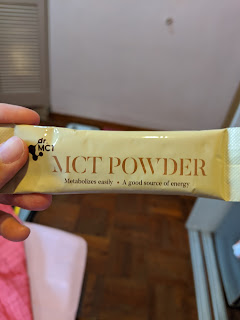What Is MCT Oil?
The acronym MCT stands for "medium chain triglyceride." For many people, the moment they hear the word "triglyceride" all kinds of warnings about saturated fat spring to mind and they back away quickly.
While it is important to talk with your doctor if you have been diagnosed with hypertension or are at risk for cardiovascular disease, certain triglycerides at lower amounts can actually be helpful to your body.
Here, it is important not to condemn all triglycerides before understanding how they work and why some are even viewed as healthy fat today.
There are three lengths of triglycerides: short chain, medium chain and long chain. Short chain triglycerides are the happy friendly bacteria in your gut that help you digest your dinner.
Medium chain triglycerides like MCT oil can actually help to add back essential fats that often are lacking in the modern western diet.
Coconut oil, from which MCT oil is derived, is a natural long chain fatty acid.
How Does MCT Oil Work?
According to the
Charlie Foundation, there are four specific medium chain triglycerides that can be found in MCT oil: caprylic acid, caproic acid, capris acid, lauric acid. Each one has a slightly different impact on your body.
Caproic acid, or C6, is the shortest MCT in MCT oil. It gets its name from its six carbon bonds. C6 is somewhat caustic and can provoke G.I. distress so should be used in moderation along with greater concentrations of other MCTs. It also has a somewhat bitter taste.
Caprylic acid, or C8, is the second shortest MCT and gets its name from its eight carbon bonds. C8 contains beneficial properties for your gut and for digestive function.
It is quite speedy in delivering energy to the cells and the brain and is often considered the "gold standard" of the MCTs.
Capric acid, or C10, gets its name from its 10 carbon bonds. C10 is quite similar to Caprylic acid except that it does not convert into energy quite so quickly.
Lauric acid, or C12, gets its name from its 12 carbon bonds. C12 is technically a MCT, but once inside the body it is processed more like a long chain fatty acid (like true coconut oil).
It heads to the gut for processing and digestion rather than going straight to the liver like the other three MCTs described here. However, it does have certain other benefits, including anti-microbial and anti-bacterial properties that can support immune function.
The best MCT oil for most purposes will contain more C8 and C10 and less C6 and C12.
What Are the Benefits of MCT Oil?
MCT oil has a number of important health and wellness benefits depending on what kind of MCT oil you take, how you take it and how much of it you take.
1. Can aid with weight loss and weight management
Without a doubt, the most well-known benefit of MCT oil is its ability to induce the body to quickly produce ketones, although this is far from its only benefit.
Ketones are only produced when your body runs out of insulin, a hormone produced by the pancreas which acts to turn carbohydrates (sugars) into energy.
When no sugars are available, the liver turns to burning fat to create energy for the cells. When your liver starts burning fat for energy, it produces ketones. Ketones are basically a type of acid that your muscles and tissues recognize as energy.
A study published by
Pharmacological Research indicates that taking MCT oil may help to suppress the creation of more fat stores by boosting metabolism and improving energy levels.
Combining this with a low-carbohydrate diet (what is now being called the "MCT diet") can help with weight loss and maintenance of optimal body weight.
2. Promotes heart health and fights high blood pressure
One of the most concerning of these is hypertension (high blood pressure). Research indicates MCT oil has the ability to help normalize metabolism and thus blood sugar, stabilize blood pressure levels and reduce risk of obesity, all of which are heart-protective.
3. MCT oil is powerful fuel for your brain
According to
Healthline, MCT oil is now being nicknamed "super-fuel" for its ability to deliver energy directly to cells without having to undergo a breakdown process first.
But more importantly for brain function and health, the ketones produced when you take in MCTs can quickly slip through the blood-brain barrier (BBB) to reach the brain cells and deliver their energy payload.
This is likely behind the popularity of early morning recipes like "bulletproof coffee," which you can learn how to make in
this short video.
Bulletproof coffee, smoothies and other breakfast items are now popular to help supercharge the brain right as the day begins.
4. Can improve athletic performance
Professional and avocational athletes are now turning to MCT oil as a natural, healthy and legal method of reducing muscle fatigue due to buildup of lactic acid.
While other studies have been less successful in duplicating this finding, MCT oil has another well-documented benefit for athletes of all stages: it helps to increase available energy stores through fat burning without having to increase intake of carbohydrates.
5. Fights fungal, bacterial and viral infections
MCT oil has demonstrated anti-fungal, anti-bacterial and anti-viral properties, a trifecta that makes it a powerful support to the body's own immune system response.
When
pitted against common bacteria like
Candida albicans (thrush, skin infections), MCT oil inhibited growth and proliferation of the bacteria.
In the
Journal of Medicine and Food, MCT oil went head to head with another known bacteria,
Clostridium difficile, that causes widespread infection in hospitals around the world, MCT oil was pronounced the victor.
The
Journal of Critical Care Medicine noted that MCTs are effective at suppressing dangerous bacteria that cause serious infection in newborns and patients with compromised immune function in hospitals worldwide.
6. May combat diabetes symptoms
Diabetes has become a major worldwide health threat today. According to the
American Diabetes Association, these diseases may impact as many as 30 million people in America alone.
The
journal Metabolism reported that not only did MCT improve weight loss efforts in a small group of diabetic adults, but it also helped reduce insulin resistance.
Another key way that MCT oil helps to fight back agains diabetes is in how it can create the right biological atmosphere to encourage weight loss. Diabetes and overweight/obesity are closely linked.
When diabetic patients are able to lose weight more quickly this can moderate symptoms of their disease and inhibit disease progression.
7. Supports a healthy gut and digestion function
Ever since the gut was identified as the
body's "second brain," interest in maintaining a healthy, friendly microbiome in the gut has skyrocketed.
MCTs have been identified as a natural aid to balancing the gut micro-biota and maintaining a majority of "friendly" and beneficial gut bacteria to aid in digestion.
Hidden within MCT oil's previously mentioned benefits of staving off bacterial, fungal and viral infections is another benefit to the gut - reduction in the number of digestion-interrupting harmful microbes.
MCT oil has the potential to
root out and destroy harmful micro-organisms that can cause systemic candida, constipation and diarrhea, stomach flu, stomach viruses and of course that traveler's staple - food poisoning.
MCT was also able to fight back against streptococcus (strep throat, pneumonia, sinusitis), straphylococcus (food poisoning, urinary tract infection), neisseria (gonorrhea, meningitis) and strains known to provoke STDs, ulcers and stomach virus.
8. Has potential to help reduce symptoms of Alzheimer's, autism, epilepsy
As
Healthline reports, the keto diet is now being recommended for some patients suffering from chronic and/or genetic conditions like Alzheimer's disease, autism spectrum and forms of epilepsy.
MCTs may also benefit patients with Parkinson's disease, glycogen storage disease, multiple sclerosis, trauma to the brain, migraines, GLUT1 deficiency syndrome, PCOS, metabolic syndrome and others.
While researchers are still working to pinpoint exactly where the connection is and how this works in each type of health issue, early studies suggest that substituting ketones as an energy source over sugars may be a key component of the benefits.
How Much MCT Oil Should I Take Daily?
As health expert
Dr. Josh Axe reports, there are several different types of MCT oil available. There are also different delivery methods, including food, oil and oil powder.
Coconut oil, of course, is the most well-known food-based source of MCTs, along with palm oil and certain other foods. Foods that contain more MCT oil naturally include dairy milk and cheese, butter and whole-milk yogurt.
MCT oil can also be used on its own. Here, the MCT oil is extracted from coconut oil into either a pure oil or an oil powder form. There are four basic extractions: emulsified, un-emulsified, organic and powder.
The type you should choose depends on how you want to use MCT oil. Un-emulsified is better for recipes, while emulsified is better for drinks. All types are stable at high and low temperatures, odorless and colorless.
MCT oil powder is a relatively new invention to make it easier to add MCT oil to your favorite recipes.
When you first start taking MCT oil, always start at the lowest recommended dose until you see how your body responds. Here, more is not always better since MCT oil can have a very powerful impact on the body.
Studies have evaluated doses as low as 5 grams and as high as 70 grams. Dr. Josh Axe recommends beginning with one-half to one whole teaspoon each day. Then you can work your way up as you see fit.
What are Side Effects of MCT Oil?
Very few side effects have been reported to date from using MCT oil.
As
Medical News Today reports, MCT oil is high calorie, and so it is important to balance intake with an overall healthy diet to experience the ketogenic results.
At too-high doses, slight side effects such as vomiting, nausea, diarrhea or upset stomach (especially when taking MCT C6) are possible.
Final Thoughts
Are you ready to experience the benefits of MCT oil for yourself? Remember, you don't have to try everything all at once. Just start slow with one thing. Perhaps add MCT oil to your morning coffee using the recipe here. Just see how it goes and enjoy the benefits!
























